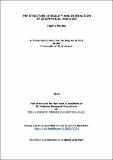The structure, stability and interaction of geophysical vortices
Abstract
This thesis examines the structure, stability and interaction of geophysical vortices. We do so by restricting our attention to relative vortex equilibria, or states which appear stationary in a co-rotating frame of reference. We approach the problem from three different perspectives, namely by first studying the single-vortex, quasi-geostrophic shallow-water problem, next by generalising it to an (asymmetric) two-vortex problem, and finally by re-visiting the single-vortex problem, making use of the more realistic, although more complicated, shallow-water model.
We find that in all of the systems studied, small vortices (compared to the Rossby deformation length) are more likely to be unstable than large ones. For the single-vortex problem, this means that large vortices can sustain much greater deformations before destabilising than small vortices, and for the two-vortex problem this means that vortices are able to come closer together before destabilising. Additionally, we find that for large vortices, the degree of asymmetry of a vortex pair does not affect its stability, although it does affect the underlying steady state into which an unstable state transitions. Lastly, by carefully defining the "equivalence" between cyclones and anticyclones which appear in the shallow-water system, we find that cyclones are more stable than anticyclones. This is contrary to what is generally reported in the literature.
Type
Thesis, PhD Doctor of Philosophy
Collections
Items in the St Andrews Research Repository are protected by copyright, with all rights reserved, unless otherwise indicated.

